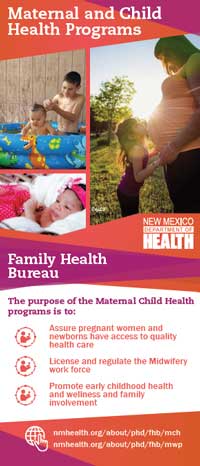Maternal Health

The Maternal Health Program collaborates across DOH programs and with diverse state agency and community-based partners to support access to care and strong, equitable maternal health outcomes for New Mexico communities. In addition to providing consultation and content expertise to partners and communities on a range of maternal health topics and initiatives, the Program currently holds these main areas of responsibility:
- Practice regulation, licensure, training and support for Certified Nurse Midwives and Licensed Midwives
- Operational staffing and grant management for the Maternal Mortality Review Committee
- Administration of the Birthing Workforce Retention Fund
- Doula certification for Medicaid provider reimbursement: Doula Program
- Administration of the Title V Perinatal High-Risk Fund
- Collaboration on the State Maternal Health Innovations Program / NM Statewide Maternal Health Taskforce
Recent Activity
News Articles
Latest
- Applications being accepted for Birthing Workforce Retention Fund (March 3, 2025)
- Midwives - essential members of the healthcare workforce (October 4, 2024)
- Make safe sleep a priority for your baby (October 1, 2024)
Popular
- Life-Threatening Infections for Newborns (August 5, 2015)
- Three Strategies to Reduce Infant Mortality Rates (March 3, 2015)
- The Underappreciated Vitamin for Healthy Children (January 7, 2015)
Health Data
Latest
- Infant Mortality in New Mexico 2009-2014 (Epidemiology Report)
Publications
Latest
- NMDOH Certified Doula Manual Application (Form)
- Becoming a Certified Doula Toolkit (2025) (Guide)
- MMRC Decisions Form - Appendix A.Contributing Factor Descriptions (Guide)
Popular
- Improving Developmental Care for Young Children and Their Families in New Mexico (Report)
- Title V Block Grant Application FY 2020 & Annual Report FY 2018 (Report)
- Opportunities to Strengthen Early Childhood Services (Report)
Resources
Latest
- Registry of Doulas Certified by New Mexico Department of Health
- Doula Certification Q&A Video
- Doula Credentialing and Access Act

